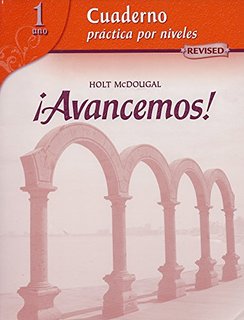
All Solutions
Page 302: Gramatica B
The words you can choose are: *either…or, neither, something, neither…nor,* and *someone.*
Remember that you can use double negatives in Spanish.
Example 1: **No** quiero comer **nada**. *(I **do not** want to eat **anything**.)*
Example 2: **Quiero** comer **algo**. *(I **want** to eat **something**.)*
There are three people talking (A, B, and C).
This is a question, so we need an indefinite word. There is a subject missing, so the word that fits the best is *”anyone” (**alguien**).*
We have a negated verb here, so to put emphasis that both x and y do not know, we will use the word *”neither” (**tampoco**).*
When you have two elements and the verb is not negated, you will use *”either…or” (**o…o**).*
When you have two elements and the verb is negated, you will put *”neither…nor” (**ni…ni**).*
There is no verb negated in this sentence, so we do not need a negative word. We need an indefinite word here. There is an object missing, so the word that fits the best is *”something” (**algo**).*
1. alguien
2. tampoco
3. o…o
4. ni…ni
5. algo
Example 1: **Quiero** comer **algo**. *(I **want** to eat **something**.)*
Example 2: **No** quiero comer **nada**. *(I **do not** want to eat **anything**.)*
Carmen prefers neither juice nor soda.
*(Carmen **no** prefiere **ni** un jugo **ni** un refresco.)*
Note how, in a Spanish sentence, the verb is negated and we used the negative conjunction *”neither…nor” **(ni…ni**).*
Carmen is never happy.
*(Carmen **nunca** está contenta.)*
When we have adverbs, we do not negate the verb to make an opposite sentence. We simply use the counterpart adverb. In this sentence, we used *always—never (**siempre—nunca**)* counterparts.
Carmen never talks to anyone on the Internet.
*(Carmen **nunca** habla con **nadie** por Internet.)*
In this example, we have both the opposite adverbs *always—never (**siempre—nunca**)* and opposite words *someone—no one/anyone (**alguien—nadie**)*.
Neither Carmen likes to use instant messenger.
*(A Carmen **tampoco** le gusta usar el mensajero instantáneo.)*
Here, we have opposite words *also—neither(**también—tampoco**)*, the former being affirmative and the latter negative.
1. no prefiere ni…ni
2. nunca
3. nadie
4. tampoco
**Hint:** Remember that double negation is allowed in Spanish.
*(Osvaldo never buys anything.)*
*(Osvaldo always receives something.)*
*Alguna cosa* can be shortened to *algo,* the meaning is the same.
*(Osvaldo sometimes shares with someone.)*

